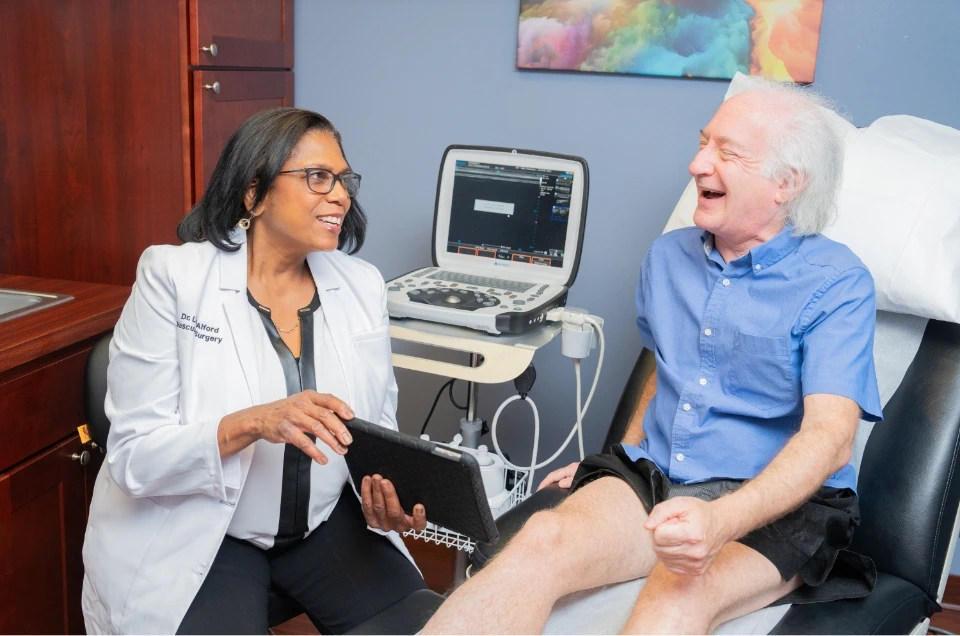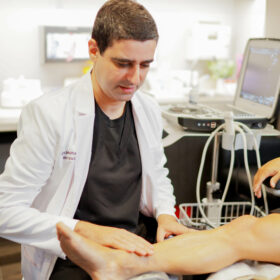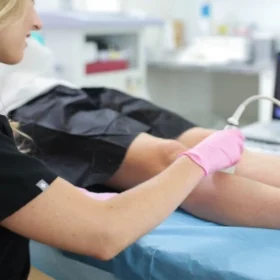At Vein Treatment Clinic, we understand that the human body operates as a complex system where physical health and mental well-being are connected. Over the years, medical research has shed light on the link between chronic vein conditions and mental health. In this guide, we explore how these seemingly distinct aspects of health intersect and influence each other.
1. Psychological Impact
Living with chronic vein conditions such as varicose veins or deep vein thrombosis (DVT) can impact your mental health. The visible appearance of varicose veins, coupled with symptoms like swelling and discomfort, can lead to feelings of self-consciousness, embarrassment, and even depression. Moreover, the chronic nature of these conditions may cause frustration and anxiety as individuals grapple with ongoing symptoms and treatment.
2. Increased Stress Levels
The presence of chronic vein conditions often contributes to heightened stress levels. Dealing with pain, discomfort, and limitations in mobility can induce chronic stress, which, in turn, negatively impacts mental health. Persistent stress may exacerbate symptoms of anxiety and depression, creating a cycle wherein mental and physical well-being continue to deteriorate.
3. Body Image Concerns
Individuals with visible vein conditions may experience body image concerns that affect their self-esteem and confidence. Varicose veins, in particular, can alter the appearance of the legs, leading to dissatisfaction with one’s physical appearance. These feelings of dissatisfaction may extend to social interactions, relationships, and overall quality of life.
4. Impaired Quality of Life
Chronic vein conditions can impair an individual’s quality of life, leading to limitations in daily activities and recreational pursuits. The discomfort and pain associated with these conditions may restrict mobility, making it difficult to engage in physical exercise. Consequently, individuals may experience a sense of isolation and frustration, further exacerbating mental health issues.
5. Sleep Disturbances
The presence of chronic vein conditions can disrupt sleep patterns, leading to sleep disturbances such as insomnia or restless leg syndrome. Pain and discomfort, particularly worsened during nighttime, can interfere with the ability to fall asleep or stay asleep throughout the night. Sleep deprivation not only exacerbates physical symptoms but also contributes to mood disturbances and memory problems.
6. Impact on Social Relationships
Chronic vein conditions can impact social relationships, as individuals may withdraw from social activities due to discomfort or embarrassment. Feelings of self-consciousness and insecurity about one’s appearance may lead to avoidance of social gatherings or reluctance to engage in activities that require exposing affected areas. Over time, this social withdrawal can lead to feelings of isolation and loneliness, further worsening mental health issues.
7. Financial Stress
The financial burden associated with managing chronic vein conditions can contribute to stress and anxiety. Treatment costs, including consultations, procedures, and medications, may place a significant strain on individuals and their families. Moreover, the inability to work or perform daily activities at full capacity due to symptoms of vein conditions can lead to loss of income and financial instability, adding another layer of stress to the situation.
8. Increased Risk of Anxiety and Depression
Chronic vein conditions are associated with an increased risk of anxiety and depression. The physical symptoms, emotional distress, and lifestyle limitations imposed by these conditions can take a toll on mental health, leading to the development or worsening of mood disorders. It is essential for individuals with chronic vein conditions to prioritize their mental well-being and seek support from healthcare professionals when needed.
Addressing the Link Between Mental Health and Chronic Vein Conditions
Recognizing the profound link between mental health and chronic vein conditions is the first step toward holistic management and treatment. At Vein Treatment Clinic, we follow a comprehensive approach that addresses both the physical and emotional aspects of vein health. Our board-certified vein doctors are committed to providing personalized care that not only alleviates symptoms but also supports mental well-being.
1. Comprehensive Evaluation and Diagnosis
We begin by conducting a thorough evaluation and diagnosis of your vein condition, taking into account both physical symptoms and their impact on mental health. Our goal is to understand your unique needs and develop a tailored treatment plan that addresses your well-being.
2. Patient Education and Empowerment
We believe in empowering patients with knowledge and resources to participate in their treatment. Through patient education initiatives, we provide information about vein conditions, treatment options, and self-care strategies that promote overall health and well-being.
3. Minimally Invasive Treatment Options
We offer a range of minimally invasive treatment options that prioritize patient comfort and safety. From endovenous laser therapy (EVLT) to sclerotherapy, our procedures are designed to address vein conditions effectively while minimizing discomfort and downtime. The following are some of the minimally invasive vein treatments we offer:
- Endovenous Laser Ablation (EVLA): EVLA involves the use of laser energy to heat and seal off diseased veins. A thin laser fiber is inserted into the affected vein, where it delivers controlled laser energy to the vein wall. This causes the vein to collapse and eventually be reabsorbed by the body while blood flow is rerouted to healthier veins.
- Radiofrequency Ablation (RFA): RFA utilizes radiofrequency energy to heat and close off problematic veins. A catheter with a radiofrequency electrode is inserted into the diseased vein, where it emits heat energy. The heat generated by the electrode causes the vein wall to collapse and seal shut, redirecting blood flow to healthier veins.
- VenaSeal: VenaSeal is a closure system that uses a medical adhesive to seal off diseased veins. A small catheter is inserted into the affected vein, delivering the adhesive directly to the vein wall. The adhesive bonds the vein walls together, effectively closing off the vein and rerouting blood flow to healthier veins.
- ClariVein: ClariVein combines mechanical agitation and chemical sclerosant to treat varicose veins. A rotating wire inside a catheter creates mechanical agitation while a sclerosant solution is simultaneously injected into the vein. This dual-action approach disrupts the inner lining of the vein and causes it to collapse, leading to vein closure and rerouting of blood flow.
- Ambulatory Phlebectomy: Ambulatory phlebectomy is a minimally invasive surgical technique for removing surface varicose veins. Tiny incisions are made over the affected veins, and the veins are gently removed using specialized hooks or forceps. This technique allows for precise removal of varicose veins with minimal scarring and downtime.
- Sclerotherapy: Sclerotherapy involves injecting a sclerosant solution into the affected veins to irritate the vein lining and induce closure. The sclerosant solution causes inflammation and scarring within the vein, leading to its eventual collapse and absorption by the body. Sclerotherapy is effective for treating smaller varicose veins and spider veins.
4. Holistic Support and Follow-Up Care
Our commitment to holistic care extends beyond treatments to encompass ongoing support and follow-up care. We provide resources for managing symptoms, maintaining vein health, and addressing any mental health concerns that may arise throughout your treatment journey.
5. Hassle-free Insurance Verification & No Surprise Billing
At Vein Treatment Clinic, we understand that navigating insurance coverage can be overwhelming, especially when dealing with chronic vein conditions. That’s why we offer hassle-hassle-free insurance verification services to our patients. Our dedicated team will work directly with your insurance provider to verify your coverage and ensure that you understand your benefits and any potential out-of-pocket costs associated with treatment.
We believe in transparency and honesty when it comes to billing, which is why we operate on a no-surprise billing policy. Before any treatment or procedure, we provide you with a detailed breakdown of costs and discuss payment options. There are no hidden fees or unexpected charges—we make the financial aspect of your vein treatment as stress-free as possible.
Schedule Your Consultation Today
The link between mental health and chronic vein conditions is undeniable. By addressing both physical symptoms and their impact on mental well-being, we can improve outcomes and enhance your overall quality of life. At Vein Treatment Clinic, we are dedicated to providing compassionate care that prioritizes the holistic health and well-being of our patients. Please schedule a consultation to explore your minimally invasive vein treatment options.











